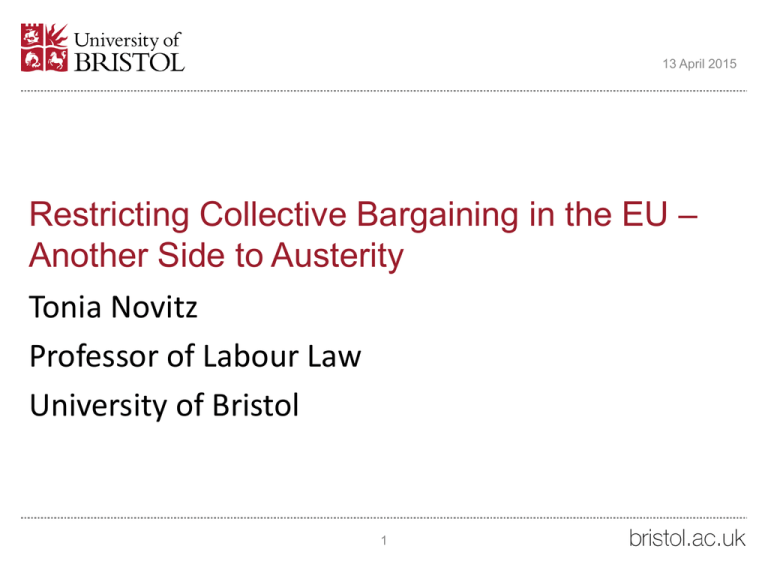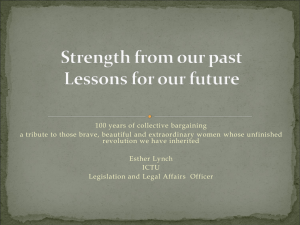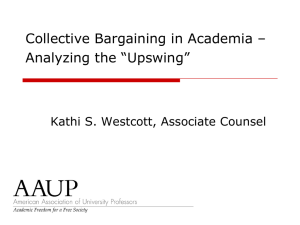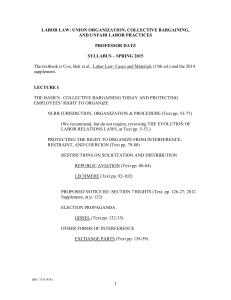Professor Tonia Novitz - The Institute of Employment Rights
advertisement

13 April 2015 Restricting Collective Bargaining in the EU – Another Side to Austerity Tonia Novitz Professor of Labour Law University of Bristol 1 13 April 2015 Bob Simpson on de-collectivisation and the law • On the right to strike • On legislative initiatives which sought to restrict collective bargaining • On the role of law… Echoes from the 1980s and 1990s in austerity measures today? 2 13 April 2015 The ‘role of law’ in EU austerity measures EU prescriptions implemented at the national level: Role of (for e.g.) the ‘Troika’ and the Euro-plus Pact. Memoranda of Understanding translated into legislative change – and imitation… European Employment Observatory (2012): ‘Structural reforms of labour market functioning, public sector costs, social security systems and wage setting/labour costs will have longer-term benefits in terms of the efficiency and effective operation of the labour market. However, because of the current economic climate, they appear to have the potential to create tensions between policy areas and give rise perhaps to negative impacts in the short-term for the achievement of other social and economic objectives…’ 3 13 April 2015 The measures and the inconsistencies? Austerity measures aim to: • Increase so-called ‘flexible’ employment • Devise new forms of ‘collective bargaining’ • Reduce national level/ sectoral bargaining • Inhibit the political voice of trade unions Inconsistent with: Previous judicial, legislative and constitutional acknowledgement of the role of freedom of association, trade unions and collective bargaining in the ‘European Social Model’. 4 13 April 2015 The worker who is not a worker and collective bargaining that is not collective bargaining • The worker who is not a worker Dismissal and rehiring (especially public to private sector) – e.g. Greece, Portugal and the UK • Collective bargaining that is not collective bargaining Enterprise level non-union ‘bargaining’ e.g. Greece, Spain, Portugal and Hungary Cf. EU caselaw? Judicial exception for collective bargaining for competition law – can it still apply? Case C-67/96 Albany International [1999] ECR I-5751: reliance on Treaty… Case C-180/98 Pavlov [2000] ECR I-6451: not applicable in certain circumstances 5 13 April 2015 Ending national sectoral wide bargaining (and its legislative extension) Two methods: • Promotion of enterprise level derogation from national level collective agreements • Removal of legislative extension of terms e.g. Greece, Portugal, Romania Cf. EU legislation? Only national level bargaining extended by legislation can set terms for posted workers: Posted Workers Directive, Art. 3 and Case C-346/06 Rüffert v Land Niedersachsen [2008] ECR I-1989 6 13 April 2015 Silencing social dialogue Union activity: collective bargaining to manage financial crisis and role of protest BUT Enactment of legislation without social dialogue and removal of consultative institutions Cf. international law Report on the High Level Mission to Greece (2011) para. 304: exceptional measures? Case 2820, complaint by Greek General Confederation of Labour (GSEE) – and see 2013 comment of Committee of Experts Cf. EU Treaties… Art. 154 of the TFEU. But also under the EU Charter of Fundamental Rights now appended to the TEU (under Art. 6 TEU). 7 13 April 2015 A summary of deep-rooted inconsistencies Measures required in the bail-out Memoranda of Understanding (and imposed even voluntarily in imitation by certain States) run counter to: • The exception to competition law made available through Albany International – i.e. judicial provision for collective bargaining • The provision made for the setting of basic norms through extension of collective agreements under the Posted Workers Directive (given a limited role but significant emphasis by the European Court of Justice in the recent Rüffert judgment) – i.e. legislative provision for collective bargaining and • The promotion of collective bargaining and protection of ‘Social Dialogue’ envisaged in the Treaty – i.e. constitutional provision for collective bargaining. 8 13 April 2015 The impact of law – and its correction Towards the economic? EMU – if you cannot devalue currency, devalue labour…? Towards the social? Cf. Demir and Baykara v Turkey [2009] IRLR 766 (ECtHR) Even if correction of the latter sort… Impact of law can be oblique… law can do damage which is difficult to ‘fix’ through legal reform… 9











